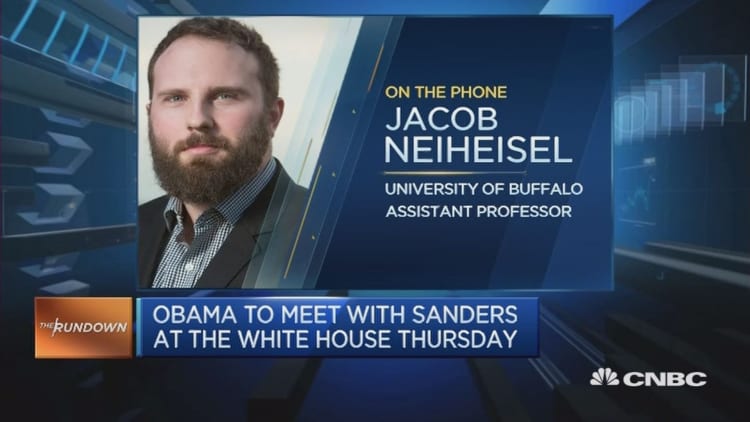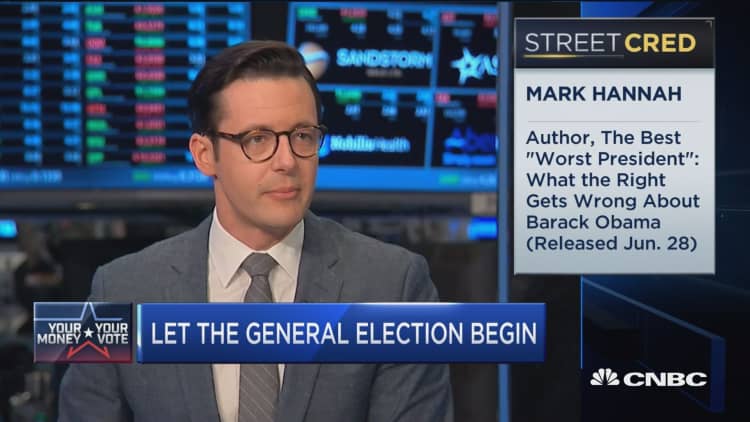The presidential primary season is coming to a close with a large sum of voters — and even some candidates — feeling the system has failed them somehow. This has led to a call for comprehensive reform of the primary election system. That said, they'll be hard-pressed to find a satisfying solution for everyone.
"I look at this starting with the base premise that no matter how you structure the delegates system, there's going to be bias on one side or the other," said James Lengle, an associate professor at Georgetown University. "There's no way you can create a system that's fair for all candidates in all states."
One of the biggest complaints surrounding this year's primaries focused on "closed" primaries, or contests where independent voters could not vote in either the Democratic or Republican contest.
In New York, nearly 30 percent of the state's electorate was left out of the April contests because of the rules. Other states with closed primary contests included Florida, Pennsylvania and Kansas.
Another complaint involved Iowa and New Hampshire being the first two states to hold their contests, giving those voters a true array of choices.
"They get their pick of the menu," Lengle said. "I think that's too much power in the hands of such small, unrepresentative states." He also said he would prefer the contests were held under a regional system in which the voting order of each region changes from season to season.
States across the country have tried to curtail Iowa and New Hampshire's influence by moving up their own contests, but Iowa and New Hampshire keep moving up theirs.
"We have a lot of states voting on the same day or early on and have them award a large sum of delegates," Chad Flanders, an associate professor at Saint Louis University in Missouri, told CNBC in a phone interview.
Complaints also came about regarding how caucuses work, which some states hold in lieu of primaries. A caucus is a local meeting financed by the major parties in which rank-and-file voters convene to display support for the various candidates. They are usually held at a public venue, such as a school gym or a town hall.
Former Secretary of State Hillary Clinton made history this week after becoming the first woman ever to clinch a presidential nomination. But she didn't do it without drawing harsh criticism from the presumptive Republican nominee Donald Trump and her Democratic rival Bernie Sanders.
In a March interview, Sanders called the concept of superdelegates — a Democratic delegate who can vote for any candidate — "problematic." "I think it might be a good idea for superdelegates to listen to the people in their own state," he said.

Trump, in a pitch to win over disgruntled Sanders supporters, said Tuesday: "To all of those Bernie Sanders voters who have been left out in the cold by a rigged system of superdelegates, we welcome you with open arms."
Clinton reached the "magic number" of 2,383 on Monday, but through a combination of elected delegates and superdelegates, which have until the July 25 Democratic National Convention to change their mind.
On the Republican side, Trump has repeatedly complained about his party's primary rules, saying they were designed to benefit other candidates more than him. "I beat a rigged system by winning with overwhelming support — the only way you could've done it," he said. "We can't fixed a rigged system by relying ... on the very people who rigged it."
That said, voters shouldn't expect much action from Congress on the matter.
As of Wednesday night, there had been no bills introduced by the 114th Congress to address presidential primary reform. Lengle said any changes would have to come from the Democratic and the Republican national committees, and that states are already given a lot of power regarding how they conduct their primaries, including timing.

"I don't think you'll see a radical change in the system, because the national parties would have a hard time getting the states to fall in line," he said.
Neither the RNC or the DNC immediately responded to CNBC's request for comment.
But concerns over the presidential primary process might reflect something deeper happening within the electorate, Saint Louis University's Flanders said.
"The concerns seem to be we've got the wrong guy, which is Trump, and … we've got the right guy, but we're making it too hard for them," he said, referring to Clinton.
Flanders noted that Sanders is only hurting Clinton by sticking around, despite Clinton having notched the nomination.
Clinton's numbers against Trump have been dwindling recently and, according to RealClearPolitics.com, she held just a two-point lead over the real estate magnate.


